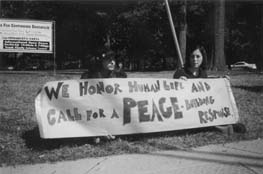Quakers don’t listen to just anyone. So what if you are the United States law? If the Society of Friends doesn’t agree, they’ll make you listen, not the other way around. And Quakers have run the show here at Guilford.
Since Guilford’s beginnings in 1837, civil disobedience has been a common practice among community members.
Between participating in the Underground Railroad and draft dodging in every war since, individuals connected with Guilford have been active participants against what individuals believe to be unjust laws.
While Guilford traditionally supports individuals and their acts of civil disobedience, the college as an institution has not actively been involved in defying unjust laws.
When Richie Zweigenhaft, Professor of Psychology, came to interview at the college in the early 70s, he was “struck by this group of men [professors] who were conscientious objectors in World War II and stayed actively involved through Vietnam [and other wars].”
Ed Burroughs, a former history professor, was hired right out of jail during that time for conscientiously objecting against the second World War. He had worked in Selected Service Camps with Raymond Binford and Charlie Hendricks, until he voluntarily went to jail to avoid helping the war effort in any way.
Legend has it that during the Civil War the men of Guilford would hide in the woods while draft officers came to the school looking for recruits.
Those same woods are where Levi Coffin helped African-American slaves escape to freedom via the Underground Railroad.
While these individuals were supported by the college, four students in 1963 were not.
Haldan Elizabeth Taylor, along with three other students, was arrested while participating in protests supporting integration which took place in downtown Greensboro.
Guilford’s response at the time was to keep students on campus at night and not encourage participation in these protests.
Taylor said, “What we were told was that the school had to respect its business partners in the community and not antagonize them.”
While she received support from the General Secretary of the Friends General Conference, the student government of the college at that time put out a statement that said that they “neither support nor condemn [her] participation.” Taylor later transferred.
Max Carter, Director of Friends Center and Campus Ministry Coordinator, said: “Institutions will seldom willingly violate the law because institutions are by nature conservative, because they are concerned with survival of the institution.”
Though Guilford is based on Quaker principles and testimonies, these ideals sometimes come secondary to the institution’s survival.
Although integration occurred at Guilford much later than most would expect, Carter believes that the general attitude of Guilford’s students and faculty supported the idea. However, the stricter Board of Trustees did not.
Even so, while not an act of civil disobedience, but rather an example of disregarding mainstream attitudes, Guilford actively enrolled students of Japanese-American descent, causing then-President Milner to be spat at often while in town.
More recently, students have participated annually in the School of the Americas Protest in Fort Benning, Georgia. Last year two Guilford students, Vera Brown and Robbie Hilton-Smith, were arrested there.
In 1996, The Guilford 20, a collection of faculty, staff, and students, were arrested for protesting K-mart and its unethical labor practices.
Over and over again Guilford’s faculty, staff, and students raise their voices against laws they feel are unjust. This principle of Quakerism is spelled out in Query #35: “Respect the laws of the state but let your first loyalty be to God’s purposes.” Or as our admission slogan says, “Be the change you wish to see in the world.

